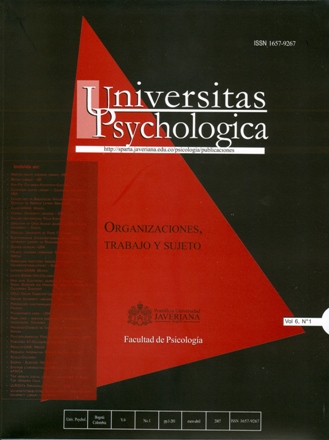Abstract
En este documento se hará una descripción de la creación de nuevas herramientas que han cambiado (o trivializado) la relación del ser humano con las dimensiones modernas que construyó, a través de la presentación de diferentes tensiones organizacionales evidenciadas en la lectura cultural de dos instituciones relacionadas con las políticas de transporte, a partir de una postura de la psicología crítica. Basado en los resultados de investigación del proyecto Psicosociología del Transporte, este trabajo analiza el discurso de integrantes de dos organizaciones para lograr un acercamiento a la forma como se comprende el espacio, el tiempo y la velocidad dentro de sus procesos cotidianos. El documento plantea preguntas para profundizar en este tema en posteriores trabajos, en especial el espacio como una necesidad para el desarrollo, y la velocidad como una característica que se debe comprender de manera crítica, antes de aceptarla como una bondad del progreso. Esto último es a lo que se refieren los autores con el título.This journal is registered under a Creative Commons Attribution 4.0 International Public License. Thus, this work may be reproduced, distributed, and publicly shared in digital format, as long as the names of the authors and Pontificia Universidad Javeriana are acknowledged. Others are allowed to quote, adapt, transform, auto-archive, republish, and create based on this material, for any purpose (even commercial ones), provided the authorship is duly acknowledged, a link to the original work is provided, and it is specified if changes have been made. Pontificia Universidad Javeriana does not hold the rights of published works and the authors are solely responsible for the contents of their works; they keep the moral, intellectual, privacy, and publicity rights. Approving the intervention of the work (review, copy-editing, translation, layout) and the following outreach, are granted through an use license and not through an assignment of rights. This means the journal and Pontificia Universidad Javeriana cannot be held responsible for any ethical malpractice by the authors. As a consequence of the protection granted by the use license, the journal is not required to publish recantations or modify information already published, unless the errata stems from the editorial management process. Publishing contents in this journal does not generate royalties for contributors.


